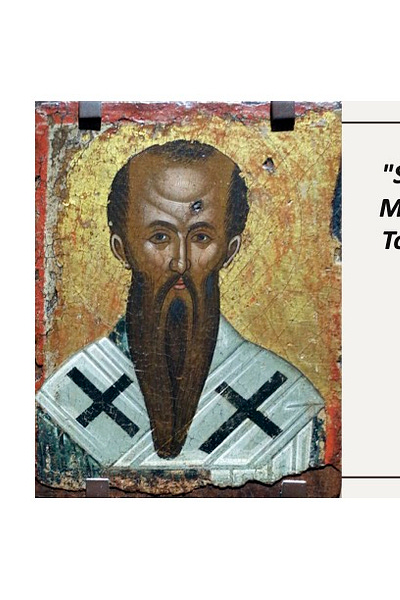Streaming Theologically? St. Basil's Guide to Modern Media
Ancient guidance on modern media for today's Orthodox Christian—PDF download and video class recording included!
Saint Basil the Great (c. 330–379), one of the Cappadocian Fathers, is one of the most influential theologian saints in the Orthodox Church. A monastic, a bishop, and a right-believing theologian of Eastern Christianity, known for his commitment to both intellectual rigor and practical morality. His work, Address to Young Men on the Right Use of Greek Literature, serves as a guide for modern Christians of all ages who would like to navigate the complexities of non-Christian media while fostering a spiritually and morally sound life.
Saint Basil emphasizes discernment in consuming pagan writings, urging young men to cultivate virtue through their studies—and these principles can be readily applied today to both popular and academic media, whether engaging media for education or entertainment. With our media-saturated environment, perhaps it is more important now than ever for us to heed his wisdom.
Today, I’d like to summarize Saint Basil’s address, and provide a 45 minute teaching video from our Saint Mark Thinking Theologically class along with a downloadable PDF of the material. No need to sign in though:
Summary of Basil’s Address
In his address, Saint Basil aims to impart wisdom to young men about engaging with Greek literature. Drawing from his own extensive education and life experience, he articulates the significance of evaluating pagan texts, distinguishing between beneficial and harmful influences.
Saint Basil begins by establishing the overarching goal of Christian life: eternal life, which is reached through virtue and guidance by the Holy Scriptures. He acknowledges that while young men may struggle to grasp these sacred texts, they can find valuable insights in the more familiar pagan literature, where truth shines through as though a window.
He likens the role of “profane” learning to leaves that adorn a fruit-bearing tree, suggesting that classical knowledge should enhance, rather than overshadow, one’s pursuit of virtue. Saint Basil advises using discernment when studying secular texts, advising his readers to embrace the uplifting and shun the detrimental. He emphasizes the need for young men to focus on literature that extols virtue. He cites classical figures like Hesiod, Homer, and, Theognis, whose praise for virtuous conduct he suggested could inspire youth to embody these ideals. Notably, he asserts that merely professing virtue is inadequate; one must embody it in life, even making references to Plato’s views about the nature of justice.
Furthermore, he encourages young men to discern between inspiring virtues depicted in stories and the vices often glorified in literature. Basil uses the metaphor of an athlete preparing for competition to suggest that just as athletes train their bodies, young men must rigorously train their minds and souls through the study of virtue.
The address also stresses that true knowledge and virtue cannot coexist with moral laxity. Basil urges his audience to pursue a disciplined life, subordinating bodily desires and material pursuits to higher goals. He asserts that a Christian should not view wealth, fame, or worldly status as worthy ambitions. Instead, the focus should be on virtuous living, which offers the ultimate reward in the life to come.
Saint Basil reinforces the importance of adopting a critical approach to literature: while poets may offer wisdom, they can also present harmful ideas. He warns that indulging in the seductive narratives of vice can lead one astray. Young men should, therefore, aspire to the ideals of noble historical figures whose lives reflect virtue, using these as models in their conduct.
He compares the process of assimilating knowledge from pagan texts to that of bees gathering honey—extraction requires discretion. Just as bees avoid thorns, young men must navigate secular literature carefully, extracting only what aligns with their values and purpose as Christians.
In addition to identifying helpful teachings, Basil highlights the formative power of literature in molding character during youth, warning that the formation during this impressionable period can last a lifetime. The young are urged to commit themselves to virtue—because only through struggle can one attain true greatness.
Saint Basil concludes with an exhortation to prioritize the cultivation of the soul over physical indulgences. He draws from classical sources to affirm that overindulgence leads to ruin, while genuine wisdom is in aligning one’s actions with higher principles rather than conforming to societal expectations for the sake of approval.
Ultimately, Basil emphasizes that through the careful study of literature—while maintaining a clear orientation toward virtue—young Christians can prepare themselves for the challenges of life and the ultimate pursuit of divine truth. He pledges to continue providing counsel, imploring the youth to heed his words and seek a life aligned with wisdom and righteousness.
Conclusion
Saint Basil the Great advocates for a discerning and virtuous engagement with classical pagan texts, emphasizing that these writings, when approached wisely, can foster moral integrity and spiritual growth.
The wisdom he lays out in his text can easily be translated to the modern world with our array of media options if the Christian is discerning and willing to put in the work.
For maximum benefit from this material, download the PDF above, watch the video here at SimplyOrthodox, or pop over to YouTube if you prefer:
P.S. For more on this topic, check out this episode from Fr. Andrew Stephen Damick and Deacon Seraphim Richard Rohlin:



